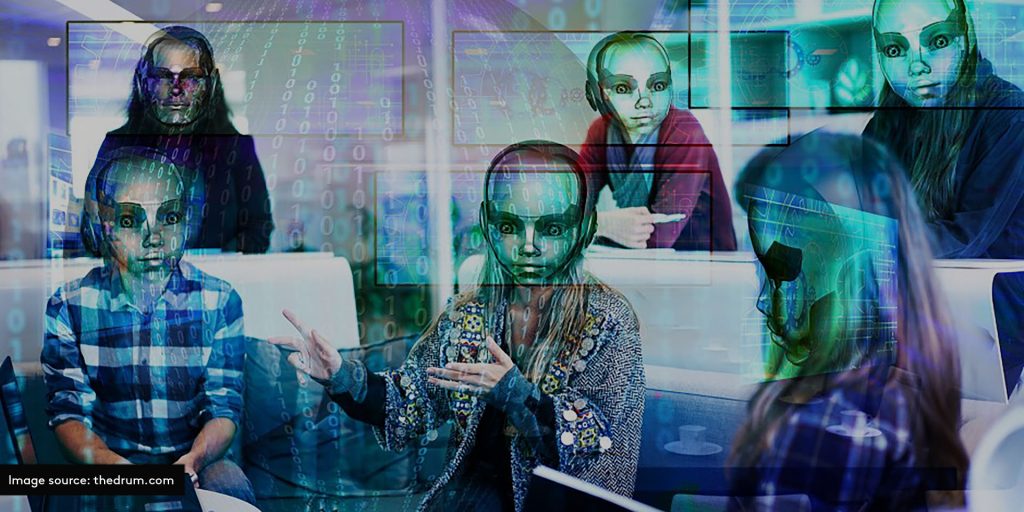Key Takeaway
AI is already having a significant impact on global enterprises. From executive decision-making to a more cohesive virtual workplace, the availability of AI tools is changing the workplace of the future for those companies who have already jumped onboard.
The c-suite executive will need to understand AI and underlying algorithmic assumptions
In the near future, we’ll need to work alongside machines in order to analyze the vast amount of data at our fingertips. The corporate executive of tomorrow will need to understand how the insights extracted from AI are calculated, what the underlying assumptions are that fuel the algorithms and what actions can be taken from the data they have available.
For many, this will also mean much less time spent gathering, compiling and analyzing data, and much more time looking at their competitive landscape and working on forward-looking strategies based on the insights their AI pulls from external information.
Said Dave Duarte of Treeshake at the Outside Insight launch event in Cape Town, “The executive of the future is going to have to be far more imaginative and highly collaborative. You need to be able to interface with the machine. So you’ll have a high level of digital quotient, analytical quotient, teamwork, etc.”

Out of this trend, we will see the rise of the Chief Data Officer and the Chief Customer Officer, and even more consumer-driven research made possible through advanced data analytics.
Actionable insights can now be extracted from customer data
As competition over customer retention continues to increase across every industry, expectations around a superior customer experience are increasingly greater, both on and offline. From AI-driven chatbots manning customer service and collecting data from inbound requests, to machine learning algorithms that continually improve customized recommendations over time, brands are finding ways of putting customers and customer data at the center of decision-making.
With this, we’re seeing the emergence of new job titles and a resurgence of focus on consumer research. The Chief Customer Officer and in-house market researchers are taking prominent roles in some of the world’s leading tech organizations, bringing a mix of marketing, operations, sales and digital knowledge.
In The Raconteur’s Future Customer Report in 2017, Jeremy Deaner, chief commercial officer of Engage Hub says, “It’s time retailers prioritised retention strategies which directly impact the bottom line, instead of simply focusing on acquisition.”
Tracking real time changes in the competitive landscape will enable earlier response
Access to real time external data has completely changed the playing field. According to Meltwater Founder & CEO Jorn Lyseggen in his book Outside Insight, “Using real-time analytics, we can spot opportunities and threats much earlier than previously and act accordingly…External data empowers companies to adjust to events as they unfold.”
Internal information like monthly or quarterly results, he argues, is no longer enough to inform future decisions. Rather than looking at historical data, we should be looking out at what’s happening in the industry around us in real time to inform our next move. “Instead of waiting for the effects of your changing competitive landscape to influence your internal figures weeks or months after the events, you’re able to detect shifts in the marketplace before they make an impact on your internal results.”

The immense volume of online news and social media information published every second means that the world is always on. If you’re not monitoring the conversations taking place about your industry and your brand in real time, you’re missing out on an opportunity to get ahead of the competition.
HR will become data-driven, and recruitment more “human”
As culture, personality fit and personal interests hold increasingly significant weight in recruitment, the process of matching talent to open roles is becoming more data-driven. AI-based tools enable recruiters to process high volumes of CVs and discover more insights about a candidate based on additional external data inputs, making the screening and interview process much more efficient, and potential matches more fitting.
With the help of AI, virtual chatbots and personality assessments in assessing needs that go beyond basic skill requirements, HR and recruitment will become increasingly more human-focused in nature.
Beyond the recruitment stage, chatbot-based coaches and HR toolkits are even leveraging data within an organization to make HR staff more efficient and effective, leaving them time to focus on team-building and improving intra-company relationships.

We’ll see less manual tasks, more high level thinking
As more AI-based tools are developed, many tasks currently performed by humans will begin to become automated, leaving human workers to focus on higher level thinking.
“With machine learning, we’re teaching computers to do things we don’t want to do ourselves,” tech journalist Toby Shapshak said. “It’s a continuation of the automation we’ve seen through the 1900s of the tasks that humans used to have to do by hand that are now being done by a system.” Alternatively, Jorn also argued, “Humans have an important role to play even when we’re surrounded by AI. Human judgment and ethics in assessing a situation is really important. AI is a tool.”
AI will help to enhance workplace productivity so employees work smarter and more efficiently. For instance, chatbot-enabled customer service can work to improve the customer experience without the need to hire a full team to respond to common requests.
Virtual workplaces will become common
More than ever before, it’s possible for a team scattered across the world to work closely together. Team members across every region and department in an enterprise can have access to the same data from a centralized source to aid in decision-making.
As well, collaboration will become much easier via conversational workplace tools and intelligent workspaces, fueled by AI. The world as we know it may, in fact, be growing smaller.

